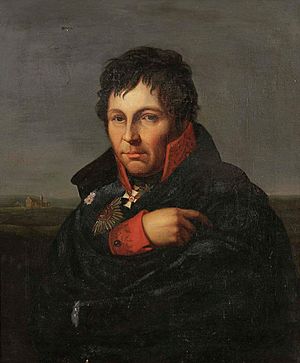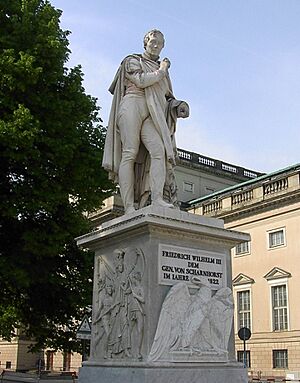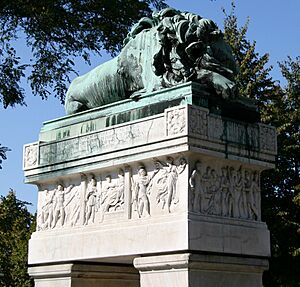Gerhard von Scharnhorst facts for kids
Quick facts for kids
Generalleutnant
Gerhard von Scharnhorst
|
|
|---|---|
 |
|
| Birth name | Gerhard Johann David von Scharnhorst |
| Born | 12 November 1755 Bordenau, Electorate of Hanover, Holy Roman Empire |
| Died | 28 June 1813 (aged 57) Prague, Kingdom of Bohemia, Austrian Empire |
| Buried |
Invalidenfriedhof
|
| Allegiance | |
| Service/ |
|
| Years of service | 1778–1813 |
| Rank | Generalleutnant |
| Battles/wars | War of the Fourth Coalition
|
| Awards | Pour le Mérite |
Gerhard Johann David von Scharnhorst (born November 12, 1755 – died June 28, 1813) was an important general from Hanover who served Prussia starting in 1801. He was the first leader of the Prussian General Staff, which is like the main planning group for the army.
Scharnhorst was famous for his ideas about how armies should work. He also made big changes to the Prussian army. He was a key leader during the Napoleonic Wars. Scharnhorst stopped harsh physical punishments for soldiers. He made sure soldiers could get promoted based on their skills, not just their family name. He also stopped hiring soldiers from other countries. He started creating a reserve army and made the army's management simpler.
Contents
Early Life and Military Career
Scharnhorst was born in Bordenau, a small town near Hanover. His family owned a little bit of land. He taught himself a lot and managed to get into a military school. This school was run by William, Count of Schaumburg-Lippe, at the Wilhelmstein fortress.
In 1778, he joined the Hanoverian army. When he wasn't busy with his army duties, he kept learning and writing. In 1783, he moved to the artillery branch. He also got a job at a new artillery school in Hanover.
He started a military magazine that lasted until 1805. In 1788, he wrote a "Handbook for Officers in the Applied Sections of Military Science." He also published his "Military Handbook for Use in the Field" in 1792.
The money he earned from his books helped him support his family. He was still a lieutenant, and his farm didn't make much money. He had a wife, Clara Schmalz, and children to take care of.
First Battles and Promotions
Scharnhorst's first military campaign was in 1793 in the Netherlands. He served well under the Duke of York. In 1794, he helped defend the town of Menen. He wrote a book about how the soldiers escaped from Menen. He also wrote about why the French army was so successful in the Revolutionary War.
Soon after, he was promoted to major. He joined the staff of the Hanoverian army group.
Joining the Prussian Army
After a peace treaty in 1795, Scharnhorst went back to Hanover. He was well-known among the armies of different countries. Several countries asked him to join their service. In 1797, he said no to an offer from Prussia. Hanover offered him a promotion to lieutenant colonel and more pay.
But in 1801, Prussia offered again, this time with double his Hanoverian pay. Scharnhorst agreed, but with conditions. He wanted to keep his rank, get a good pension, and become a noble. So, he joined King Frederick William III of Prussia's army.
Teaching and Reforms
The Prussian Military Academy quickly gave him important teaching jobs. Carl von Clausewitz, a famous military thinker, was one of his students. Scharnhorst also started the Berlin Military Society.
In 1806, Prussia went to war. Scharnhorst served as the chief of staff for the Duke of Brunswick. He was slightly hurt at the Battle of Jena-Auerstedt in October 1806. He showed great courage during the Prussian army's retreat. He stayed with Blücher during the last part of the terrible campaign. He was captured with Blücher but was quickly exchanged.
Scharnhorst played a big part in leading L'Estocq's Prussian group, which fought with the Russians. For his service at the Battle of Eylau in February 1807, he received Prussia's highest military award, the Pour le Mérite.
It was clear that Scharnhorst was more than just a good staff officer. He had learned about war from older times. But as he gained more experience, he realized that old ways of fighting wouldn't work anymore. He understood that Prussia needed a "national" army. This army would be made up of all citizens, not just professional soldiers. He also believed they needed to fight big, decisive battles to win against the French Revolution's new style of warfare.
Leading Army Changes
After the Peace of Tilsit in July 1807, Scharnhorst was promoted to major-general. He became the head of a special group to reform the army. This group included other smart young officers like Gneisenau and Boyen. Even Stein, a key government minister, joined the group. He helped Scharnhorst talk directly to King Frederick William III.
But Napoleon quickly became suspicious of these changes. King Frederick William often had to stop or cancel the reforms Scharnhorst suggested.

Slowly, Scharnhorst began to change Prussia's old army. This army had been destroyed at the Battle of Jena in 1806. He wanted to turn it into a national army where everyone served. This idea of universal service wasn't fully put in place until after his death. But he set up the plans for it.
He stopped hiring foreign soldiers. Harsh physical punishments were limited to only very serious cases. Soldiers could now be promoted based on their skills and achievements. The army's management was made simpler and better organized. He also started to create the Landwehr, which were army reserves.
Final Campaign and Death
In 1809, a war between France and Austria gave hope to those who wanted to fight Napoleon. Napoleon noticed this. Scharnhorst managed to avoid a rule that made all foreigners leave Prussian service. But in 1811–1812, France forced Prussia to become its ally against Russia. Prussia sent an army to help Napoleon. At this point, Scharnhorst left Berlin on a long leave. During this time, he wrote a book about firearms.
But when Napoleon's army retreated from Moscow in 1812, it was a signal for Prussia's new national army to fight.
Scharnhorst was called back to the king's headquarters. He turned down a higher job. Instead, he became chief of staff for Blücher. Scharnhorst trusted Blücher's energy and his ability to inspire young soldiers. A Russian prince, Wittgenstein, was so impressed by Scharnhorst that he asked to borrow him as his chief of staff. Blücher agreed.
In the first battle, Lützen (also called Gross-Görschen) on May 2, 1813, Prussia lost. But it was a different kind of defeat than Napoleon usually caused. The French lost many soldiers. They also didn't have enough cavalry to chase the Prussian army. This meant it wasn't a complete victory for Napoleon.
In this battle, Scharnhorst was wounded in the foot. The wound itself wasn't very serious. But the hard work of the retreat to Dresden made it worse. He died on June 28, 1813, in Prague. He had traveled there to talk with Schwarzenberg and Radetzky. He wanted to convince Austria to join the war. Shortly before he died, he was promoted to lieutenant-general.
King Frederick William III had a statue built in Scharnhorst's memory in Berlin. Scharnhorst was buried at the Invalidenfriedhof Cemetery in Berlin.
Legacy and Influence
Scharnhorst's name has been used for many things:
- SMS Scharnhorst, a German armored cruiser from 1906, used in World War I.
- Scharnhorst, a German battleship from 1936, used in World War II. It was the lead ship of its class, which also included the Gneisenau.
- Infantry Division Scharnhorst, a German infantry division from 1945. It was one of the last new army groups formed in World War II.
- Scharnhorst Order, the highest military award of the former East German army.
- Scharnhorst (F 213), a British ship from 1943. It was given to West Germany in 1959.
- Many streets in German cities, including Berlin, Hamburg, Munich, and Cologne.
General Hans von Seeckt has been compared to Scharnhorst. Seeckt helped prepare the German Army after World War I. The army was greatly limited by the Treaty of Versailles. But Seeckt secretly helped it get ready to fight again. He also prepared a General Staff. He is given credit for the German army's great success in the campaigns of 1939-1940.
After the rise of the Nazis, Field Marshal August von Mackensen compared von Seeckt to Scharnhorst. He said that the "old fire" of German military strength was still there. Winston Churchill also believed that von Seeckt was very important. He thought Seeckt helped Germany quickly return to its strong position in the military world.
See also
 In Spanish: Gerhard von Scharnhorst para niños
In Spanish: Gerhard von Scharnhorst para niños
- German General Staff
 | Toni Morrison |
 | Barack Obama |
 | Martin Luther King Jr. |
 | Ralph Bunche |


